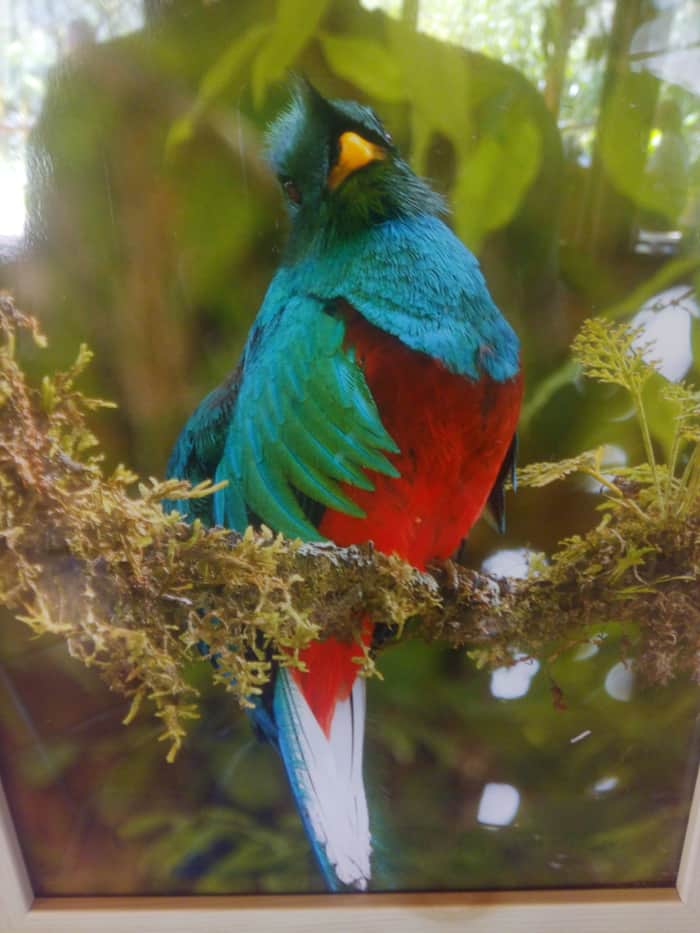Zoo Ave, located in La Garita de Alajuela, is more than just a collection of birds. That said, the variety of birds found in Costa Rica is impressive, from song birds to big-billed toucans to elusive Quetzals. There is even a score of peacocks that struts around beguiling visitors into taking photos.
But Zoo Ave also has mammals and reptiles, assorted monkeys and scaly iguanas. It is a rescue center, a preservation center, an educational and environmental park and place for the public to enjoy a delightful day outdoors.
As a rescue center, Zoo Ave receives about l,000 animals a year. They are brought in because they are injured, sick or abandoned, and some, like the occasional porcupine or boa constrictor, wander into urban areas and must be brought back to safety.
Others, like the cuddly little congo or howler monkeys, were once pets but were donated to Zoo Ave when owners couldn’t give them proper care. Green parrots and scarlet macaws thrive and are part of a breed-and-release program, but we get to see them flying among the trees while white-face monkeys scamper along cables or feed in fruit trees. Iguanas stare at you and then scamper up trees. A boa constrictor, safely tucked behind glass, is coiled in a sleeping heap.
A number of owls and other raptors remain under a veterinarian’s care, because they’ve fallen out of nests or have injuries. Some animals were brought in by the Environment Ministry because they were illegally taken from the wild. In some cases the mothers were killed by poachers who wanted to sell the babies, says Aluda Méndez, a veterinary assistant who spends her days feeding and caring for injured animals.
An amazingly fat crocodile sits and stares as crowds go by. He only eats once a week, according to the guide, so he’s no threat. Two pumas, or mountain lions, are permanent guests. Their mother was killed by hunters, and as kittens they never learned to live in nature. But Luna and Selva play a important role in Zoo Ave’s campaign against illegal hunting. You can take them home with you in the form of a coloring book or poster sold in the gift shop.
Zoo Ave gives visitors a chance to see Costa Rica’s flora and fauna in a totally natural setting. Delightful but discreet signs campaign against the capture and imprisonment of wild birds and animals in cages.
Although Zoo Ave is not really a zoo, a few exotic birds do make their homes here. The Emus, or small ostriches, were part of an abandoned commercial herd that had no place else to go. The peacocks were once somebody’s decorations.
Zoo Ave is also a botanical garden with shady walks for keeping cool while admiring and studying tropical plants and flowers.
Zoo Ave is a rehabilitation center for animals that have been taken away from their natural environment but will be able to return. Two safe and secure release areas, one in Nicoya and one in the Osa Peninsula, provide protection where released birds and animals can adjust.
And now you can get a birds-eye view of the park from a tree top level canopy tour, with three platforms at 80, 200 and 165 meters: not so high that it’s only for the brave, but comfortable enough to enjoy overlooking the park.
A refreshment stand with an outdoor eating area offers a comfortable place to rest up over a snack, although peacocks may surround looking for a snack of their own. The gift shop has books, posters, pictures and true Tico-made souvenirs at low prices. There’s also an ample parking area and easy entrance for baby carriages or wheelchairs. Zoo Ave, as an environmental center, uses recycled materials in all new construction as the refreshment stand and the new hospital, still under construction, demonstrate.
Zoo Ave is a nonprofit park and all fees go toward feeding and housing animals and creating educational campaigns to protect wildlife. Prices are ¢4,900 ($9.80) for adults, ¢2,000 ($4) for children, nationals and residents, $20 for foreign tourists (there are also discounts for seniors and students). The canopy tour is ¢9,000 ($18). Visitors who just want to use the canopy do not need to pay the park entrance.
Zoo Ave is open Mon.-Fri from 9 a.m.-5 p.m. Location: Dulce Nombre de La Garita, Alajuela. From Alajuela, take road to Barrio San José and turn left at the church, or take a Dulce Nombre bus. By car from Pan American highway, get off at Atenas-Manolo’s exit and go north 2.5 kilometers.






